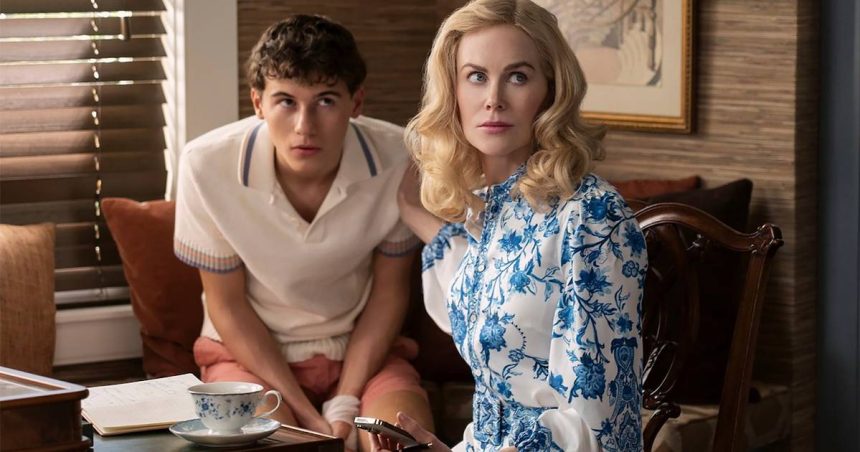Netflix miniseries The Perfect Couple has been doing numbers for the streamer since it debuted in September—and the novel the series is based off of has been doing numbers for its publisher, Hachette Book Group.
The show, centered on a woman marrying into a wealthy Nantucket family whose wedding is derailed by a murder, is based on the novel of the same name and is the latest success story for novelist Elin Hilderbrand, whose titles have gotten plenty of viral love on BookTok, according to David Shelley, CEO of Hachette. Since the adaptation was released, the book has seen a 250% growth in print formats, according to Hachette.
In January, BookToker Brady Lockerby (@bradylockerby), who has more than 645,000 followers on TikTok, held up a stack of books roughly the height of her torso in a post about her favorite novels from Hilderbrand. A few months later, Milana Waller (@booksforlosers) described Hilderbrand’s novels as “fire” in a post liked nearly 60,000 times.
Hilderbrand’s already a multiple-time bestseller, and her books have sold more than 20 million copies, but Hachette is all-in on making her an even bigger success, Shelley said, whether that’s through leveraging the high-profile screen adaptation or working with BookTok influencers to promote upcoming titles.
Shelley spoke to us about the effects TikTok has had on book marketing and how the growth of the platform and the popularity of book-to-series adaptations have changed the way publishers like Hachette approach marketing.
“I’ve been in publishing for 25 years, but I don’t think I’ve seen such a significant force in terms of a platform before that helps to sell books,” he said of TikTok. “It’s pretty much the most powerful force that I’ve seen in terms of selling books.”
Post about it
One of the biggest new challenges for publishers is one that social marketers have known for a long time: It can be pretty much impossible to predict what content might go viral, or when. When it does, though, Hachette’s marketing team puts marketing firepower behind those titles—and quickly, Shelley said.
“People are really influenced by what they see and read online in terms of other people’s recommendations and what people are saying,” Shelley said. “Increasingly, our job is about responding really fast to what’s happening.”
Hachette has seen the power of virality many times. Take the novel Archer’s Voice by Mia Sheridan, which was originally published in 2014 and published by Hachette in 2018. As the book gained steam on BookTok, sales grew from 20 copies a week to about 150 in spring 2021, according to the publisher; By early 2022, the book was selling an average of 1,500 copies a week, and by fall 2023 that number swelled to more than 5,000 copies a week.
TikTok posts can, at near-lightning speed, introduce would-be readers to new titles. Two TikToks about the novel The Housemaid by Freida McFadden exposed over 632,000 users to the title, and more than 3,700 people saved those videos, according to Hachette.
Once a Hachette book goes viral on BookTok, its marketing team moves fast to advertise it on platforms, especially Meta platforms, Shelley said. For romance-novel phenomenon Colleen Hoover’s release Verity, Hachette advertised and posted about on its social channels including Facebook. The 17 ad campaigns Hachette ran for Verity were some of its best-performing, according to the company, notching 7%–8% more impressions than its other campaigns; Those campaigns also boasted a conversion rate that was 20% higher than Hachette’s average.
Get marketing news you’ll actually want to read
Marketing Brew informs marketing pros of the latest on brand strategy, social media, and ad tech via our weekday newsletter, virtual events, marketing conferences, and digital guides.
“There’s a wider, diverse group of fans across all media for Colleen Hoover, and that’s partly because we’ve been marketing her to those regions,” Shelley said.
According to Shelley, younger audiences are already finding books organically on TikTok, so the publisher doesn’t spend a ton on the platform. By taking out paid ads on platforms with different user bases, though, the publisher is aiming to show off books to other, potentially older groups who may not have heard about the book elsewhere.
“It’s like a house, and everyone’s in different rooms,” Shelley said. “You’re going into a different room of the house and saying, ‘Hey, there’s this thing over here that you might be interested in.’”
For some upcoming titles, there’s an effort to get the book to take off on TikTok in the first place. Ahead of the 2025 publication of Hilderbrand’s upcoming book The Academy, co-written with her daughter, Shelby Cunningham, the publisher plans to get copies of the upcoming book into the hands of influencers and market the book on TikTok and across social, as well as in other places where books are sold, Shelley said.
Watch party
As BookTok reshapes the way Hachette markets titles, streaming adaptations are also changing the way the publisher thinks about driving book sales. In the case of The Perfect Couple, the series quickly became the most-streamed title on Nielsen’s streaming charts the week it debuted in September, and amassed over 50 million views after less than three weeks on the platform. And after the show debuted, The Perfect Couple has seen strong book sales, he told us.
Shelley said there can be a “virtuous circle” surrounding a series adaptation that can benefit both entertainment companies and publishers, where promotion for either book or series can benefit the other project. In some cases, Hachette coordinates with the entertainment company on marketing, including by featuring imagery from the adaptation in a reprint’s artwork.
“In the best-case scenario, all the marketing for the movie will help the book, and all the marketing for the book will help the movie,” Shelley said.
For the recent film adaptation of the Hachette book The Wild Robot by Peter Brown, which follows an animated robot stuck on an island, Hachette capitalized on the film’s box-office success (it raked in almost $270 million at the global box office) by “reprinting, reprinting, reprinting” copies of the book and incorporating imagery from the film in the book’s cover art, Shelley said.
Like guessing whether a book will go viral, though, it’s anyone’s guess whether a movie or TV show will be a success, Shelley said—and in the case of adaptations, whether it will translate to book sales.
“You can never quite predict until something comes out how it’s going to be received by readers and fans,” he said. “In the digital age, that’s even more the case than before.”
Read the full article here










